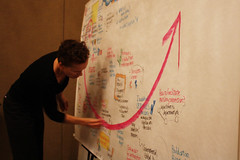 |
| Graphic Notetaking (Photo credit: derekbruff) |
Between that entry and this one are eleven entries in which I share a note taking experiment in my doctoral course 07.704 Introduction to Qualitative Research methods. Each student has created a 1 page visual introduction to a selected chapter from Denzin and Lincoln's "Sage Handbook of Qualitative Research".
The eleven entries are diverse in their methods of presentation, ranging from simple webs or a single picture to a cartoon, a powerpoint slide, and visual/textual combinations that range across a page.
As the instructor of this interesting crew, I can see the individual personality in each one from humor or confidence, to the sense of organization or wonder. Personal expression flows to the surface of each one-page rendition.
I also see the powerful draw of the disciplinary focus in which they are embedded, be it politics, science, math, school administration, or language learning. Each discipline has shaped the individual's preferred way of visualizing in some respect.
In creating this 1 page set of thoughts about an article, they are, of course, interacting with a specific author or authors. Topics included critical pedagogy, feminism, mixed methods, case study, grounded theory and more. As the individual learner from my class encountered this new material they also encountered the author who is distinctively represented within the article. It was this individual who introduced my student to this topic. What kind of a guide are they? How well do these personalities mesh, regardless of the topic and its interest?
There were certain visual elements in each piece that stopped us in our tracks: Jay Lang's upside down house in the discussion of grounded theory is a good example or Aubrey Rochembeau's turned upside down article about Case Study method. It is probably not strictly correct to call Nancy Nickerson's poem a visual--but it had a similar effect. To write a poem in response to a poetry writing ethnographer appealed to our entire group.
In describing the process of creating a visualization, students brought us more deeply into the process of their own reading experience and the making sense of the individual text with which they were grappling. Dave Sciuto's twining vine reminds me of this...or Kim Gustenhoven's "cells" that surround the edge of her image frame.
This assignment and its discussion took place in a class where I am constantly nudging students to think about the possibilities of the visual or visualization. It's a fascination of mine that I seek to share with them. Many would not have taken this route without the assignment. Because each student read a different article, I cannot imagine what our discussion would have been like without a visual element to help us connect to the auditory experience of simply hearing a description of the article.
I would say I have gone from Take Note to Make Note and quite a few things in between.
In attending the Take Note conference, I was particularly interested because as a qualitative researcher, my whole world is about taking notes--fieldnotes (observations, interviews, sketches, photos)--every way that I can possibly document the cultural experience of whoever I am studying. As a teacher of qualitative research, I am teaching others to take notes in these forms, and, in so doing to consider what it means to "take note" as qualitative researchers do.
In the exercise that I share here in my blog, my students are taking note of the ideas of other qualitative researchers and, through these notes, I hope becoming more attuned to a certain set of notions that are important to this field. These were not private notes, but deliberately public notes. Also these were not informal notes; they came with instructions about format and content. So, are they really notes? Is this a form of a paper? As occurred at the Take Note Conference the notion of note has become deeply problematized (at least for me) through this inquiry.




